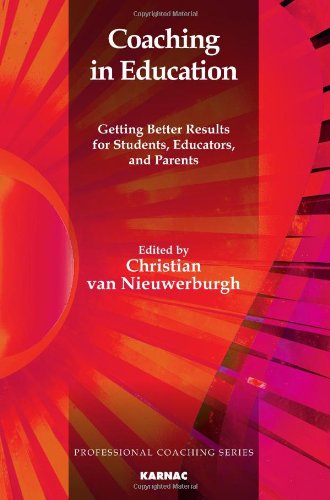Coaching in Education: Getting Better Results for Students, Educators, and Parents

Book Details
- Publisher : Routledge
- Published : 2012
- Cover : Paperback
- Pages : 256
- Category :
Coaching - Catalogue No : 32912
- ISBN 13 : 9781780490793
- ISBN 10 : 1780490798
Customer Reviews
Our customers have given this title an average rating of 4 out of 5 from 1 review(s), add your own review for this title.
Dr. Gilli Beskin on 23/05/2013 01:25:28




 (4 out of 5)
(4 out of 5)
Finally, a book on this very exciting, important and promising topic of using coaching in the education field. The author took on the mission of trying to cover much of what is done in this field in educational systems around the world using research-based knowledge. Coaching still has a relatively small amount of documented empirical research, particularly concerning coaching in the educational field. However more experience is gained each year and putting it all together gives an interesting overview. This knowledge about different uses of coaching, mainly meant to create better experiences of learning in schools, is relevant for educators, coaches and scholars.
I found many chapters very interesting and a wide relevant range of activities and research documenting its success. Nevertheless, I thought that the coaching world does not end in the UK, USA and Australia and a wider look at things done in other places would add to the variety of information, specially as many scholars who took part in writing the book work in all these places so that what is done in one place is very much influenced by what is done in others.
A second point is that I found Cognitive Coaching missing. It is wrong historically as this is one of the first coaching frameworks to be thoroughly used and researched beginning in the early 80s in the States . This is also a specific educational version of coaching and this book, like much of the academic writings on coaching, is dominated by psychologists. This is not necessarily bad, but I feel it creates a bias of some sort. I would like to see more research on coaching in the education field carried out by educators. (For example, Chapters 5 and 7 in the book present the use of positive psychology and of the toughness personality concept as the basis for work in schools).
Two last points -the first is technical- I read the electronic version and was disappointed not to be able to read any of the tables.
The last comment refers to the mixture of researched knowledge with practitioner type knowledge such as descriptions of detailed workshops for staff in schools. I am not sure all these belong together, or to the same types of readers, although I personally found it all interesting and enriching. That is why I dedicated a series of books on everyday coaching for educators to the second type only.
To sum up, this is an interesting book and important to all educators.

